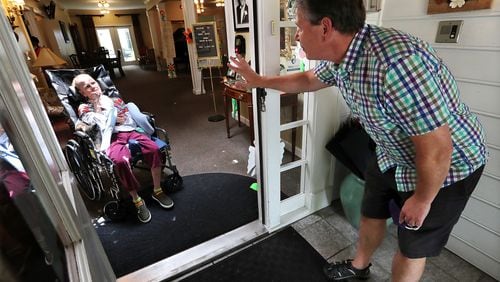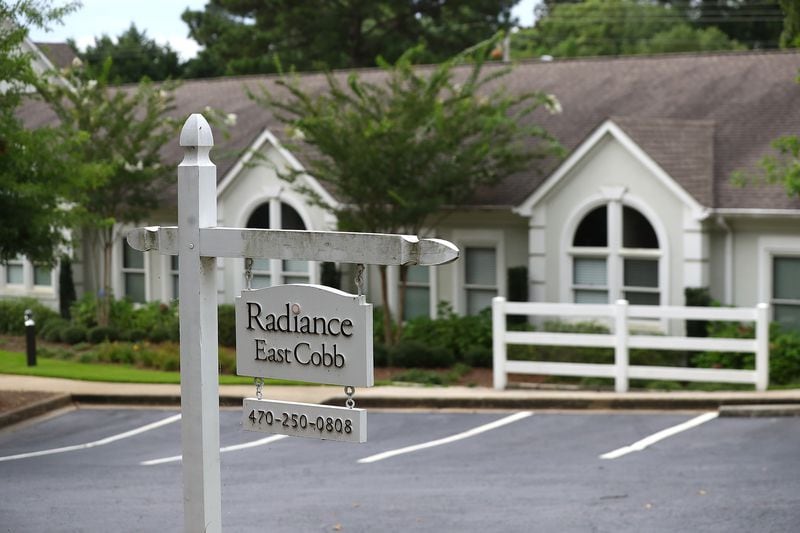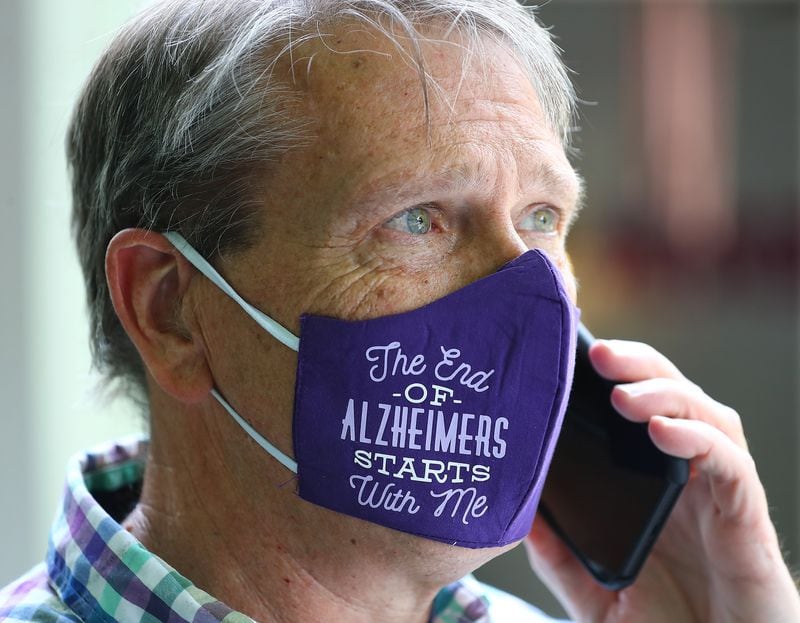In late April, Dan Goerke received an urgent message from Radiance East Cobb assisted living community, where his wife, Denise, had been living for nearly two years.
The 25-bed memory care facility had struggled financially for more than a year and was in the process of trying to turn the business around when the coronavirus bludgeoned the economy. Even though the facility had no outbreak, the pandemic pushed its business to the brink of financial collapse.
Like other senior care homes, Radiance went on lockdown in mid-March, which made it tough to attract new residents. On the call to Goerke, the facility director told him the owners had decided it was time to shutter the business. Families had until the end of May to find a new place for their loved ones.
“Here we are in the middle of a pandemic and (they) decide to close,” Goerke said.
Credit: Curtis Compton
Credit: Curtis Compton
While the impact of the virus on nursing homes has been widely publicized, the pandemic has also laid bare the vulnerabilities of the assisted living and large personal care home industry that thousands of Georgia families rely on to protect their loved ones.
While these private pay facilities often tout luxury amenities and an active lifestyle, many of their residents are in their 80s and 90s, frail and suffering from chronic health problems —the population most at risk from COVID-19. Some 1,068 residents and 837 staff across more than 260 facilities in Georgia have contracted the virus, state records show. More than 240 resident deaths have been reported so far. Across the country, more than 7,000 residents in assisted living facilities may have died from the virus, according to a recent congressional estimate.
To try to safeguard residents and staff, the facilities have had to absorb high costs for testing and protective equipment. Meanwhile, occupancy has shrunk at many facilities, further squeezing their finances. At dozens of Georgia homes, half the beds are unoccupied as facilities remain on lockdown, state figures show.
Now, the industry is pressing the federal government for relief. Nursing homes nationwide have received close to $10 billion in federal pandemic relief, but few assisted living or personal care homes have received such help. Without it, industry officials say they could face an untenable financial crisis in a system that cares for hundreds of thousands of elderly residents.
The impact on the entire senior housing industry could be tens of billions of dollars, said James Balda, president and CEO of Argentum, a national trade group representing the industry. He said providers are doing everything they can to combat the virus.
“Over time the strain is going to be significant,” Balda said. “We’ve been on the front line of this.”
Impact on care unknown
Many providers across Georgia’s senior care industry were already struggling long before the pandemic.
An AJC investigation last year revealed how the industry’s rapid expansion over the past decade drew investors from around the country and even the globe, leading to a gold rush mentality in metro Atlanta’s senior housing market. The influx of investment led to the market getting overbuilt, driving up costs and competition, which jeopardized care in some facilities that became financially distressed.
To fill beds, some admitted or kept residents who needed more care than the homes could provide, and cash shortages led to inadequate staffing and neglected maintenance.
Many of these financial stresses have been exacerbated by the pandemic. Atlanta remains one of the most overbuilt markets in the country with the second lowest occupancy rate among among the 31 major metro markets, according to report last month by NIC, a nonprofit that tracks the senior housing industry.
“We saw a pretty dramatic impact on demand,” said Beth Burnham Mace, NIC’s chief economist, who said the industry is facing its most challenging crisis with the impact of the pandemic coupled with an economic crisis. “It will be a challenging market in Atlanta for an operator. They are already under pressure.”
Exactly how these challenges are impacting care during the pandemic is largely unknown.
That’s because the oversight system that existed before the pandemic has been limited by the crisis.
The Georgia Department of Community Health inspects both nursing homes and assisted living facilities and personal care homes.
When it comes to nursing homes, the agency takes its oversight cues from the federal government, which sets the rules and regulations. DCH was under orders to focus on infection control and serious health and safety threats at nursing homes, with a deadline to complete on-site inspections by July 31.
But Georgia assisted living and personal care homes are governed by state rules and regulations. Since the pandemic took hold in March, onsite inspections for these facilities have largely ceased.
“Aside from nursing home work, we are not conducting onsite inspections except in limited circumstances, such as immediate jeopardy situations,” the department said in a statement. “We are working to increase our onsite activity at other facility types, including personal care homes and assisted living communities.”
With few inspection reports and families shut off from visiting homes, the public is largely in the dark about the conditions in these state-regulated facilities. Even the state ombudsman for long-term care, who serves as a consumer advocate, has been unable to go into facilities that have been on lockdown.
“I don’t think any of us thought this would go on as long as it has, which makes us more concerned about these residents who are hidden from view,” said Melanie McNeil, the state’s long-term care ombudsman. “It’s gone on for months and months, and nobody on the outside has a clear picture of what’s going on.”
Occupancy suffers
The toll of the virus on assisted living and large personal care homes can be seen in the state’s daily coronavirus report.
Arbor Terrace at Cascade, an assisted living facility in southwest Atlanta that had an outbreak in the spring where 17 residents died, is licensed for 92 residents. But a recent daily census to the state showed just 34 residents.
Brookdale Lawrenceville, a personal care home where more than 10 residents have been infected and five have died, is licensed for 72 beds but recently reported just 23 residents at the facility, state records show.
“I don't think any of us thought this would go on as long as it has, which makes us more concerned about these residents who are hidden from view. It's gone on for months and months, and nobody on the outside has a clear picture of what's going on."
Waterford of Oakwood, an assisted living facility near Gainesville, had an outbreak in April that resulted in 11 resident deaths, according to state records. The facility is licensed for 72 beds, but a recent census showed 50 residents.
Waterford is operated by Capital Senior Living, one of the nation’s largest senior care operators but one that also has had lagging financial performance. In early 2019, the company launched a three-year turnaround plan.
But in May, the company reported to investors that the coronavirus had created financial challenges that threatened its ability to continue “as a going concern,” according to Securities and Exchange Commission filings. The pandemic had been cutting into revenues and disrupting operations, driving up costs and reducing move-ins.
On Thursday, the Texas-based company announced second quarter results, which included $2.9 million of COVID-19-related costs and occupancy dips related to the pandemic. Executives announced a restructuring plan to transfer 18 under-performing facilities to Fannie Mae, which backs mortgages, in an effort to offload debt and reduce expenses. The company would not disclose the locations of the 18 facilities.
“These communities have been heavily impacted by the current COVID environment,” said Kimberly S. Lody, president and chief executive officer. “With their unsustainably high debt load and generally difficult operating conditions, it did not make sense for us to continue incurring steep losses after debt service.”
$5 billion sought
Some providers in Georgia see hope that federal aid will arrive soon. National trade groups in recent weeks have been encouraging assisted living and senior care providers to sign up through a federal database that would be used to help distribute funds. The industry is seeking $5 billion. They’ve also asked Congress to help give them priority access to protective equipment and testing and help cover costs of testing.
Tony Marshall, the CEO of the Georgia Health Care Association, which represents hundreds of nursing homes and assisted living facilities, said relief is needed. Assisted living operators are not designed to be health care providers, but with a vulnerable population that has been largely locked in their buildings for months, the homes have to provide services they haven’t historically had to deliver.
At the same time, providers have struggled to hire new staff, amid concerns about potential exposure to the coronavirus, which has driven up costs, he said.
“We certainly know the reality is if you continue to incur higher costs and reduced admissions, it is not sustainable,” Marshall said.
While hoping for government help, homes have had to devise their own strategies to protect and keep residents.
Norcross-based PruittHealth, whose core business is nursing homes in the Southeast, has been able to avoid major outbreaks at its five assisted living communities in Georgia. But occupancy rates have fallen by 9 percent.
“These communities have been heavily impacted by the current COVID environment. With their unsustainably high debt load and generally difficult operating conditions, it did not make sense for us to continue incurring steep losses after debt service."
CEO Neil Pruitt said the company is starting to deploy technology in an effort to help combat the virus and rebuild trust. Thermal cameras are being tested to monitor temperatures at entry points, air ionization systems installed to help filter and inactivate the virus, and visitor management systems added to make it easier and safer when facilities reopen to visitors.
“Across the industry, I think assisted living is going to have to make our customers feel safe and that they would be safer inside our facility than their own home,” Pruitt said. “I think providers that can’t step up and do that, especially in the (overbuilt) Atlanta market, will not make it.”
Rep. John LaHood, R-Valdosta, whose family operates five senior care homes, mostly in South Georgia, said the crisis has sparked an entrepreneurship and creativity to solve problems the pandemic has created. One of their homes has a chapel that residents cherish. Instead of cancelling weekly Sunday services, the staff now holds them outdoors and socially distanced.
The company’s home in Valdosta had an outbreak in late March, but overall the company has been able to keep the virus at bay and manage through the risk, said LaHood, who helped lead a legislative reform effort that passed in June to increase protections and oversight of the senior care industry.
An ongoing challenge for operators is offering the lifestyle that residents and their families want. One of the appeals of the senior living homes has been the socializing and non-institutional feel. For now, many of those opportunities are on hold.
“Some of the things we used to take for granted, I think we appreciate a lot more now,” he said. “I miss the days I could walk through my building without a mask and pat people on the back, tap them them on the arm and sit close and have a conversation.”
Credit: Curtis Compton
Credit: Curtis Compton
‘leap of faith’
For Goerke and his wife, the pandemic has been the latest twist as they navigate Georgia’s senior care system.
In October 2012, Denise was diagnosed with early-onset Alzheimer’s at age 56. The family cared for her at home before she entered her first memory care center four years ago. That facility had “horrible problems” and care suffered, Goerke said.
Goerke moved his wife to Radiance East Cobb in August 2018. The facility had been through different management companies and a name change as it tried to stabilize its business and fill beds as competition in the Atlanta senior housing market intensified.
Still, Goerke said, the frontline workers remained dedicated to his wife, and overall he had been pleased with the care she received.
After he received word that Radiance would be closing, Goerke scrambled to find a new home for his wife. He called as many as 15 facilities that all turned him down. Some weren’t taking new residents because they had COVID-19 outbreaks. Others said her care needs were too great for their staff to handle.
After weeks of the searching, Goerke found The Mann House in Sandy Springs, which agreed to admit his wife. He was able to see the facility through a virtual tour on Facetime.
“In the end, it was a big leap of faith,” said Goerke, a former board chair of the Alzheimer’s Association, Georgia Chapter.
As Denise and the family navigate the late stages of the disease, Goerke said she has received good care in her new home. Still, he worries about the broader implications of a care system that has been so strained by the pandemic.
“There’s got to be a better way to do this,” he said. “It’s got to go beyond just profits.”
Our Reporting:
As investors flocked to Georgia to cash in on the wave of retiring baby boomers, metro Atlanta’s senior housing market became one of the most overbuilt in the country. This drove up costs while facilities cannibalized the market as a gold rush mentality took hold. An AJC investigation last fall revealed how care suffered at dozens of facilities whose owners or operators were in financial distress. Today’s story examines how the coronavirus pandemic has made those conditions worse. Operators are facing rising costs and lowered occupancy as they grapple to contain the virus and protect residents and staff.
About the Author









